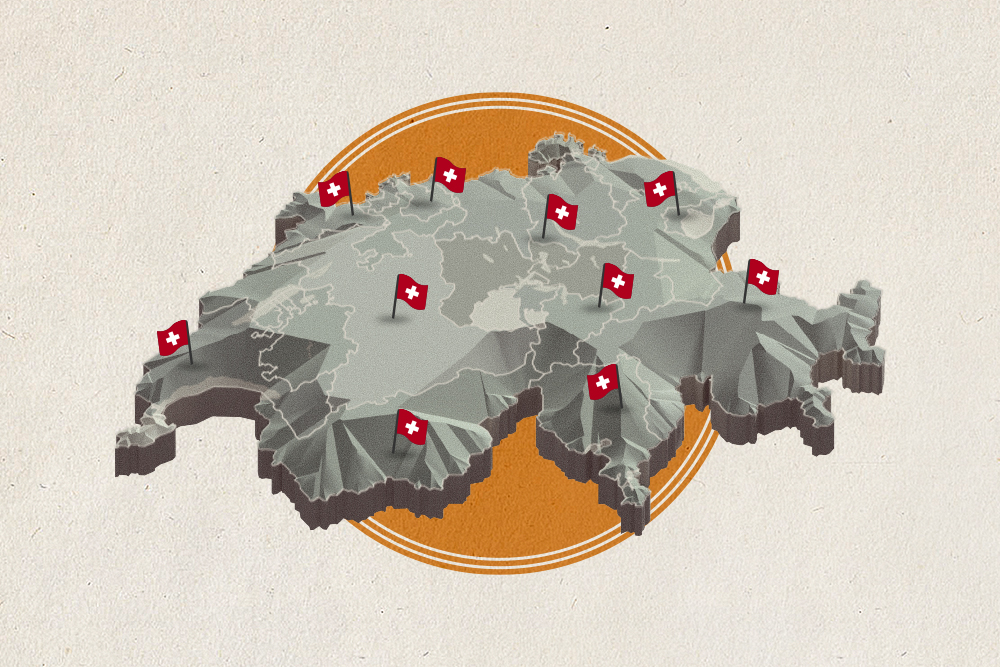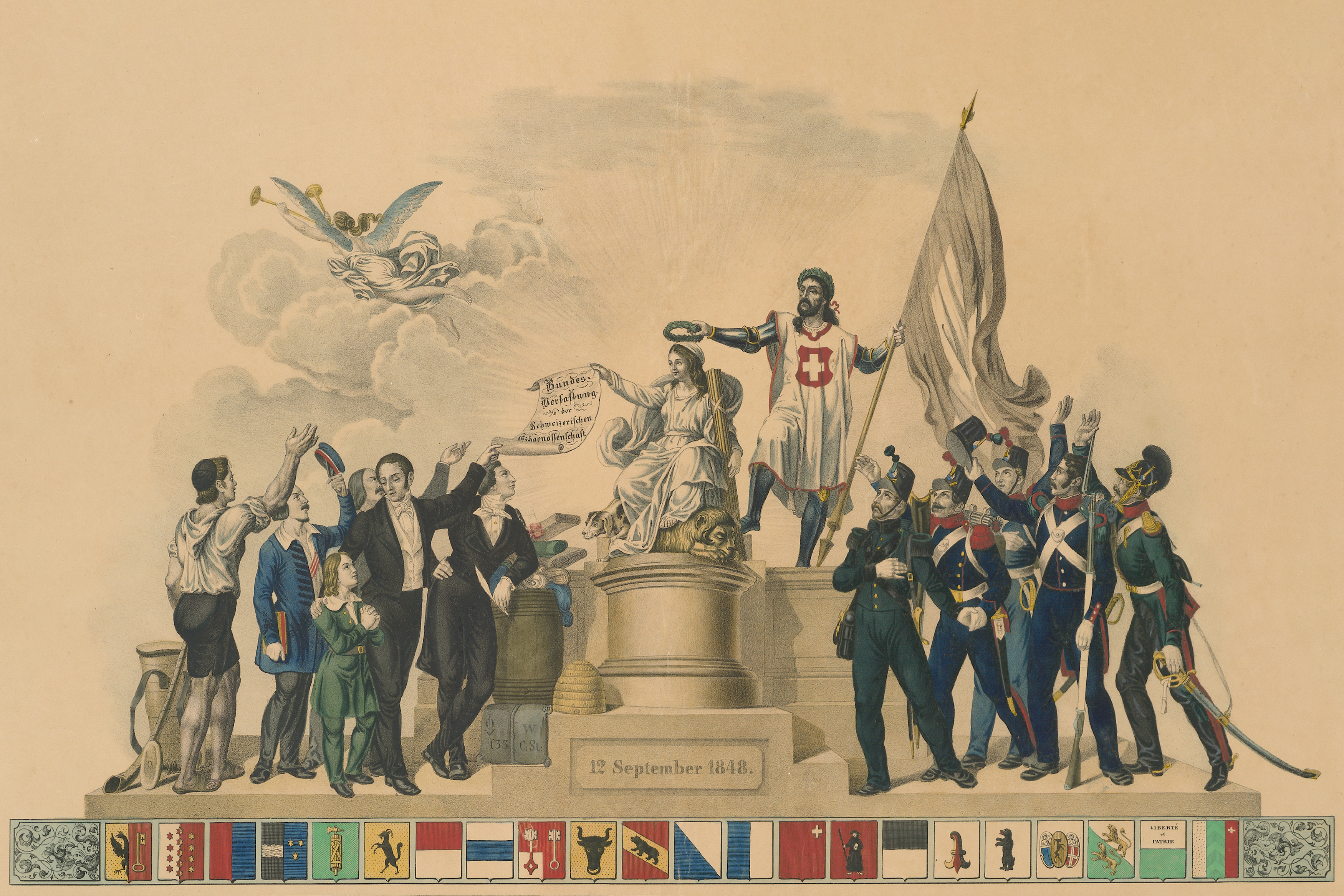
How Swiss federalism emerged and shapes the nation

In a country with four official languages and 26 cantons, federalism is a principle deeply rooted in the people and political system of Switzerland.
Swiss federalism is a cornerstone of the Swiss political system.
A country of four languages, Switzerland sees itself as a nation built on political will and consensus, rather than one defined by shared culture or ethnicity.
But the building blocks of the modern Swiss state are set in a patchwork of medieval alliances between cantons and villages. The Latin word foedus – meaning “covenant” or “alliance” – gave rise to the term “federal,” and captures the spirit of compromise that underpins Swiss statehood.
After a brief civil war, Switzerland was reconstituted as a federal state in 1848. What had been a confederation of states was transformed into a federation – a change opposed by the war’s losers, the small conservative cantons.
The decision to adopt a federal structure was a concession to these conservatives. It was a way to ensure their interests would continue to be represented within the new political system.
Federalism deeply rooted in Swiss society
Federalism is something the Swiss still take pride in today. A 2021 Australian studyExternal link compared how strongly people in both decentralised and more centralised countries support the core principles of federalism. On average, the study found that found that support for the values of a federal constitution was strongest in Switzerland and weakest in Belgium.
Nowhere was the belief more firmly held than in Switzerland that all parts of a country should have a say in national matters.
Another strong conviction for the Swiss, though slightly weaker than in Germany, is the belief that different levels of government should work together while also maintaining a clear separation of responsibilities.
The principle of subsidiarity and cantonal authority
The Swiss federal state is divided into 26 cantons and more than 2,100 municipalities. The country has three political levels: the federal government, the cantons, and the municipalities. As in other federal states – such as Canada, the United States, or Brazil – the principle of subsidiarity applies.
This means that municipalities are free to manage their own affairs, within the framework of cantonal and federal law. If municipalities are unable to handle certain responsibilities, they are taken over by the canton, or if necessary, by the federal government. In turn, the cantons are free to act wherever they are not restricted by legislation at the national level.
Municipalities defend their interests vis-à-vis the higher level, just as the cantons do in relation to the federal government.
The Swiss constitution stipulates that the cantons “participate in the federal decision-making process”. Political scientist Rahel Freiburghaus describes, in her dissertation, how cantons sometimes seek to assert their own interests through what she calls “cantonal lobbying that chips away at the federal constitution”.
The phrase “cantonal authority” appeared in public discourse most recently during the Covid-19 pandemic. At times, you could walk past shuttered restaurants in Basel on your way to the train station, only to find people drinking mulled wine in Bern an hour later.
During certain phases of the pandemic, the cantons were free to decide on closures and other public health measures independently.
The cantons’ majority
Meanwhile, cantons exercised their federal rights in a way that had not been seen since the 1950sExternal link. At the end of November 2020, a popular initiative failed because it did not win the support of a majority of the cantons. The Responsible Business Initiative sought to hold Swiss companies liable for human rights violations committed abroad.
The initiative was supported by a narrow majority of voters. It failed to pass because it won approval in only a minority of cantons.
Every constitutional amendment – including mandatory referendums – must win not only a majority of the popular vote, but also majorities in more than half of the 26 cantons.
Until the 19th century, before Switzerland’s modern era, all national matters were decided by cantonal majority. This means that all matters which affected the whole of Switzerland were decided by what the majority of the cantons wanted.
This cantonal majority in referendums and the Senate are two institutions, in place since the founding of the federal state in 1848, which give smaller cantons leverage to defend their interests.

More
Our democracy newsletter
The cantons’ house
Since 1848, small cantons have been guaranteed representation in nationwide matters through the Senate. It, together with the House of Representatives, makes up the Federal Assembly, and both houses of parliament must approve any decisions that are made.
Each canton is represented by two senators, although some cantons only have one seat for historical reasons. The Senate is modelled on the US Senate.

More
Sister republics: what the US and Switzerland have in common
From confederation to federation
From the 1870s onward, conservatives and federalists from the French-speaking and political minority, used motions in parliament and referendums to oppose a constitution that they believed ran counter to their values.
In doing so, they signalled “a fundamental yes to the federal system”, as political scientists Felix Buchli and Dieter Freiburghaus write. Since then, no major political force has seriously pursued a return to a confederation
Federal taxes: still provisional since the First World War
It was not until 1915 that the Swiss federal state was granted the authority to levy its own tax on income and assets.
The federal government’s legal right to collect taxes is still granted only provisionally. In a 2018 referendum, Swiss voters extended the legal basis for federal taxation. A majority no vote would have cost the federal government more than half of its revenue, but 84.1% were in favour. The current provisional arrangement is valid until 2035.
Within the next ten years, voters in Switzerland’s four-language, 26-canton federation will once again be asked: should the federal state still be allowed to collect taxes?

More
How Swiss direct democracy works
Edited by Mark Livingston, Adapted from German by David Kelso Kaufher/ds

In compliance with the JTI standards
More: SWI swissinfo.ch certified by the Journalism Trust Initiative





























You can find an overview of ongoing debates with our journalists here . Please join us!
If you want to start a conversation about a topic raised in this article or want to report factual errors, email us at english@swissinfo.ch.